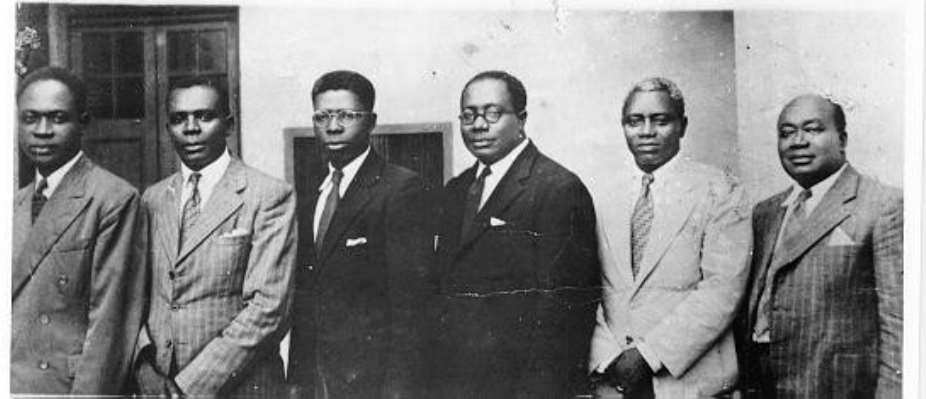I'm writing a book where a portion is dedicated to the legacy of Nkrumah in global political affairs. I've continually maintained that if the first two pages of any book on Africa's politics does not mention Nkrumah's name, you can trust me to throw that book away. It's not good enough. Nkrumah remains the preface of Africa's politics and nationalism. For that matter, it's essential to emphasise Nkrumah's frontal role in the African struggle for independence, beginning from Ghana. However, I think it's also historically accurate to allocate him as one of the founding fathers of modern Ghana alongside with his political friend and rival J. B. Danquah.
Prior to Nkrumah's invitation to join the United Gold Coast Convention (UGCC), which had been formed by J. B. Danquah and co. in 1947 as a pro-self-governance organ, Danquah had effectively expanded the expediency for self-governance ideology for the Gold Coast. Between 1927 and 1951, Danquah had already gained a national reputation as a lawyer, Newspaper editor of the "Times of West Africa" which he founded in 1931, youth activist between 1937 to 1947, and member of the British Legislative Assembly in 1951. Nkrumah came to inherit a legacy that made his radical "self-government now" possible. We may have divisive ways of interpreting history but Nkrumah's alliance with the UGCC, was a cushion for his political ambitions, and one that gave him much orientation of state affairs.
I perceive Nkrumah as a "now now" politician. For example the motto of the Convention People's Party (CPP) was "Self-government now", and again his foreign policies of decolonising Africa was a "now" agenda. On the 24 May 1963 in a meeting represented by 31 African states in Ethiopia’s capital Addis Ababa, and that which gave birth to the Organisation of African Union (OAU), Nkrumah made a passionate appeal for an urgent African unity against the influence of imperialism. He began his speech by saying “Our objective is African union now" and ended with the words, "Africa must unite!" Nkrumah's radical political kingdom was always imminent. His opponents, J.B. Danquah and co., were progressive radicals. Both had the same political goals but the means were of diverging stratagem.
Pan-Africanism is shaded in different spheres of outlook and meant differently to both Nkrumah and J. B. Danquah. Whereas Nkrumah was more concerned about continental African identity and unity, J. B. Danquah was concerned about national identity and unity. Nkrumah had a brave nationalistic policies though, nevertheless, his foreign policies became a struggle that led to his downfall, and the nightmare of Ghana.
Nkrumah's matchless role for Ghana's independence is undisputed. His contribution to Africa's liberation surpasses every African leader. His political theories of decolonisation, and authentic Africanness against neo-colonisation were keen. Without Nkrumah, Ghana's history would have been something else. However, the struggle was not a one-man battle. Others laid the foundation and fought alongside which makes Nkrumah a pioneer co-founder of modern Ghana irrespective of the rivalry that existed between him and his opponents.





 Akufo-Addo spotted ordering chiefs to stand for his handshake
Akufo-Addo spotted ordering chiefs to stand for his handshake
 Akufo-Addo ‘disrespects’ every chief in Ghana except Okyenhene — NDC Communicato...
Akufo-Addo ‘disrespects’ every chief in Ghana except Okyenhene — NDC Communicato...
 Supreme Court clears way for dual citizens to hold key public positions
Supreme Court clears way for dual citizens to hold key public positions
 Be transparent, don’t suppress the truth – Prof. Opoku-Agyemang to Jean Mensa
Be transparent, don’t suppress the truth – Prof. Opoku-Agyemang to Jean Mensa
 ‘I won’t tell the world I was only a driver’s mate during challenges’ – Prof Jan...
‘I won’t tell the world I was only a driver’s mate during challenges’ – Prof Jan...
 We’ll prosecute corrupt officials of Akufo-Addo’s govt – Prof Jane Naana
We’ll prosecute corrupt officials of Akufo-Addo’s govt – Prof Jane Naana
 [Full text] Acceptance speech by Prof Jane Naana Opoku-Agyemang as 2024 NDC Runn...
[Full text] Acceptance speech by Prof Jane Naana Opoku-Agyemang as 2024 NDC Runn...
 Election 2024: Don’t be complacent, we haven’t won yet – Asiedu Nketia cautions ...
Election 2024: Don’t be complacent, we haven’t won yet – Asiedu Nketia cautions ...
 Election 2024: Stop fighting over positions in Mahama’s next govt – Asiedu Nketi...
Election 2024: Stop fighting over positions in Mahama’s next govt – Asiedu Nketi...
 Prof Jane Naana Opoku-Agyemang will restore dignity of vice presidency – Fifi Kw...
Prof Jane Naana Opoku-Agyemang will restore dignity of vice presidency – Fifi Kw...
